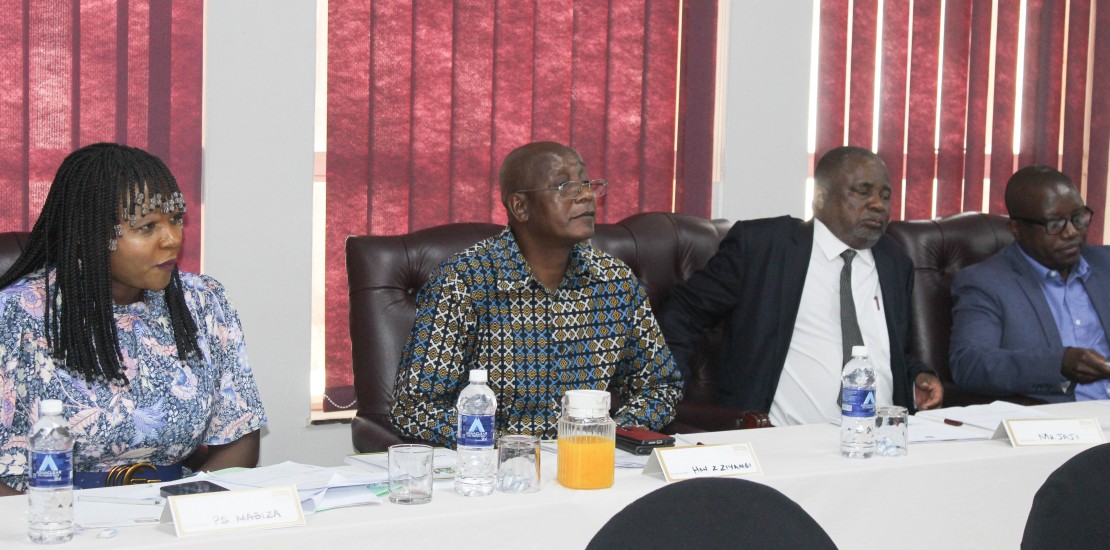- November 14, 2022
- Posted by: Clever K Mlambo
- Category: News

The Ministry of Justice, Legal and Parliamentary Affairs (MoJLPA) held a high-level consultative meeting on the position of the death penalty in Zimbabwe in Kadoma from the 5th to the 6th of November 2022.
Present at the meeting was the Minister of Justice, Hon. Z. Ziyambi, Permanent Secretary for the Justice Ministry Ms. V. Mabiza, Mr. Jaji, Secretary of State for Provincial Affairs Mashonaland West Province, Ms. F. Chimbaru, the Deputy Attorney General, MoJLPA representatives, Civil Society Organisations (CSOs) that included Zimbabwe NGO Forum, Zimbabwe Lawyers for Human Rights, Veritas, Amnesty International, Legal Resources Foundation, Zimbabwe Institute and Zim Rights, represented too was the Law Society of Zimbabwe, Judicial Service Commission, National Prosecuting Authority, Zimbabwe Prison and Correctional Services (ZPCS), Zimbabwe Republic Police (ZRP), Ministry of Defence, Legal Aid Directorate, a representative from the Switzerland Embassy to Zimbabwe and members of the media.
Supported by the Centre for Applied Legal Research (CALR) and the Switzerland Embassy to Malawi, Zambia and Zimbabwe, the high-level meeting was a platform for the invited stakeholders to share their views with the MoJLPA, regarding their position on the death sentence in Zimbabwe. The Ministry currently has no official position except that it is provided for in section 48(2) of the Constitution as read with provisions of the Criminal Law Code.
Zimbabwe has been on a de facto moratorium on executions for about 17 years, the last executions were done in 2005.
In Presenting his keynote address, the Minister of Justice, Legal & Parliamentary Affairs articulated how the traditional justice system in Zimbabwe worked. Hon. Ziyambi Ziyambi highlighted how we had a reconciliatory culture.
“… Traditional communities did not carry death penalties, we had alternative justice delivery systems like ‘kuripa Ngozi’ (appeasing the dead spirits) …”, said Hon. Ziyambi.
The Minister asked a question to the gathering; “should we kill those who kill?”.
Such questions enabled robust discussions and enabled the stakeholders to assess the issue from all possible scenarios and enable them to emerge with a position that will be accepted by the people, as the law-making process involves everyone.
The Constitution maintains the death sentence but excludes women, men under the age of 21 and men over the age of 70, further explained the Minister.
Permanent Secretary (P.S.) in the Ministry of Justice, Legal and Parliamentary Affairs, Ms. V. Mabiza in her opening remarks articulated how the consultative meeting enabled key discussions in mapping the way forward in shaping the legislative framework of the death penalty in Zimbabwe.
The P.S. encouraged invited stakeholders that in evaluating our laws there is a need to be cognizant that our laws can be the best practices. She added that sometimes, “there is no need to always look up to other jurisdictions in formulating our laws, our laws can be the best.”.
The P.S further highlighted that the Kadoma gathering enabled invited stakeholders to come up with a position on either keeping or removing the death penalty.
Some participants were for the abolishment of the death penalty, whilst others felt that it was well couched in the constitution as it is only carried out when someone murders or kills a victim in aggravated circumstances.
Chief Nhema gave an example of when the death penalty can be a suitable remedy. He gave an example of someone breaking into a person’s household then raping that person’s daughter right in front of him and proceeding to kill the daughter and the mother. The chief said that in these circumstances, the death penalty should be upheld.
Some of the CSOs felt that death by hanging was inhuman and caused much pain and that it involves a lot of people making them part of the hanging team. This they say has implications on also those who carry out the hanging process. They wanted the death penalty to be abolished as it is cruel, inhuman, degrading and has elements of torture, especially for those with delayed executions.
The continuous waiting for a convicted person to be hanged was seen as a painful period, especially since Zimbabwe last carried out the death penalty in 2005. A call was made to assess which is the better evil, carrying out the executions or keeping a person waiting for his hanging time without any proper and known time frame.
In further discussing Zimbabwe’s position on the death penalty, a question was posed by one of the invited participants, “If Mbuya Nehanda was alive today, what will she say when we are still debating about the death penalty …?” Such questions poked the stakeholders to think and assess broadly about the death penalty in light of our heritage and background as a nation.
Some concerns by the stakeholders were on possibilities of errors & wrongful executions, they pushed for the abolishment of the death penalty as death is irreversible and that there is no way to compensate for the loss of innocent life in cases of wrongful convictions and executions.
The Security sector represented by the ZPCS & ZRP said that they will stick to their mandate as dictated by the laws of the country. The security sector’s position on the death penalty is based on what the law says as opposed to what the law ought to be. In their interpretation of these provisions, they submitted that the law is the law and must be applied as is.
Currently, Zimbabwe has 62 convicted persons facing the death penalty and they are kept at Harare Central Prison, an institution that houses all convicts who are to face the death penalty.
The Ministry of Justice will roll out consultations across the country as they seek to take into consideration the views of the people and have a well-informed position on the state of the death penalty in Zimbabwe.
